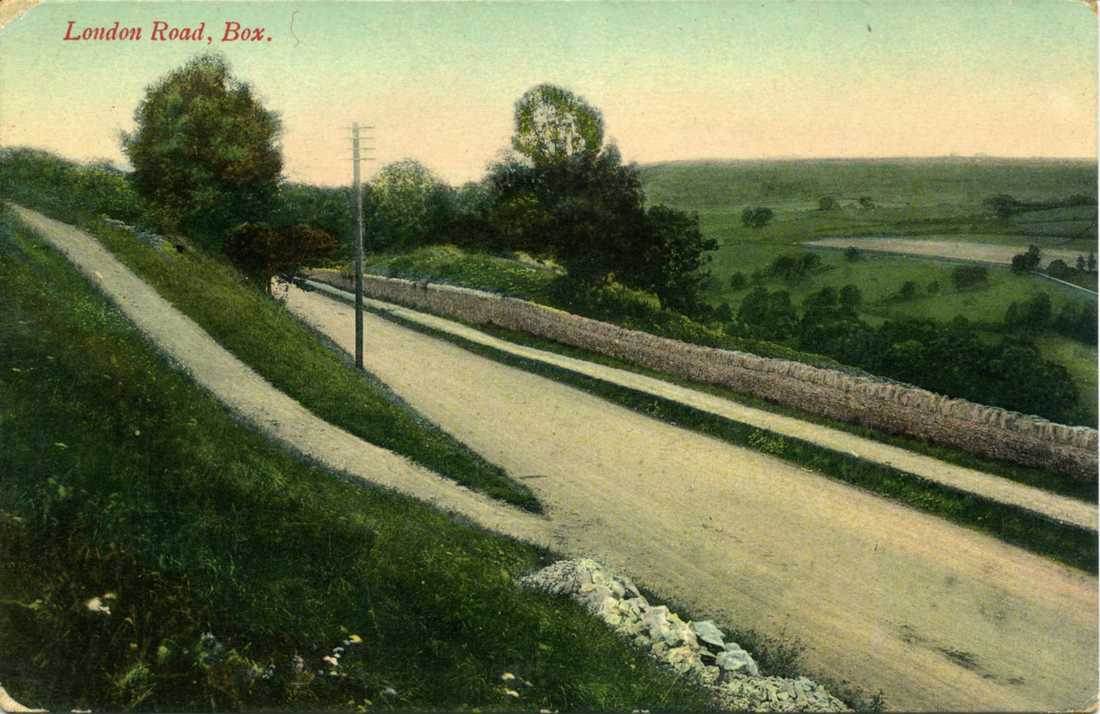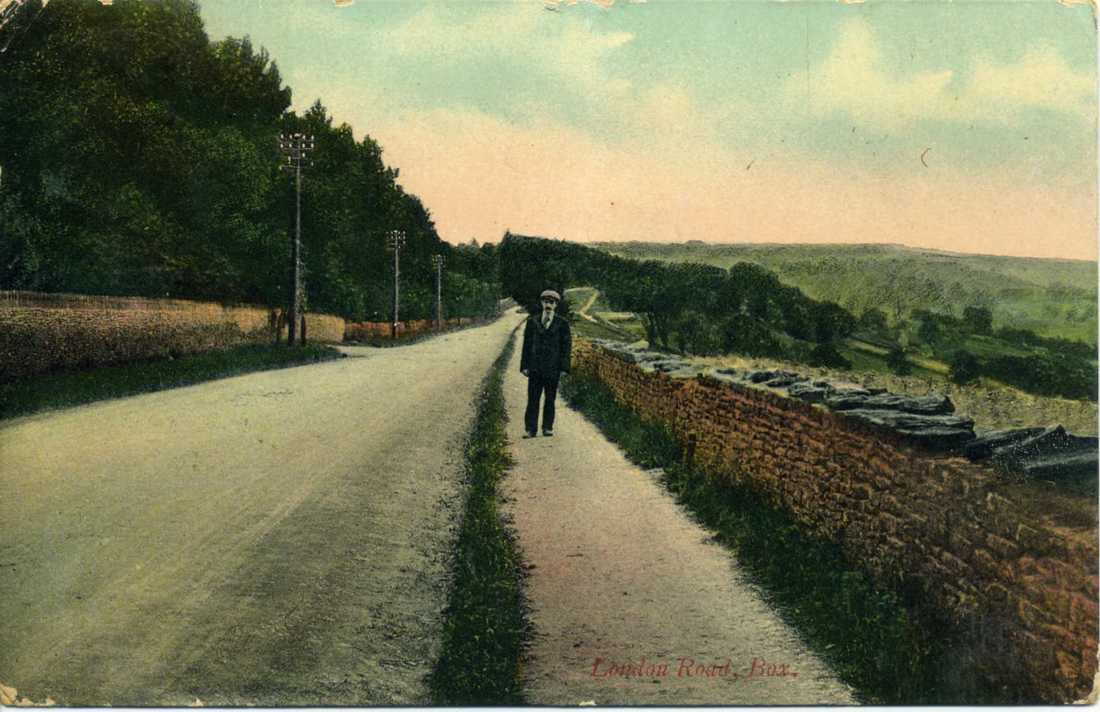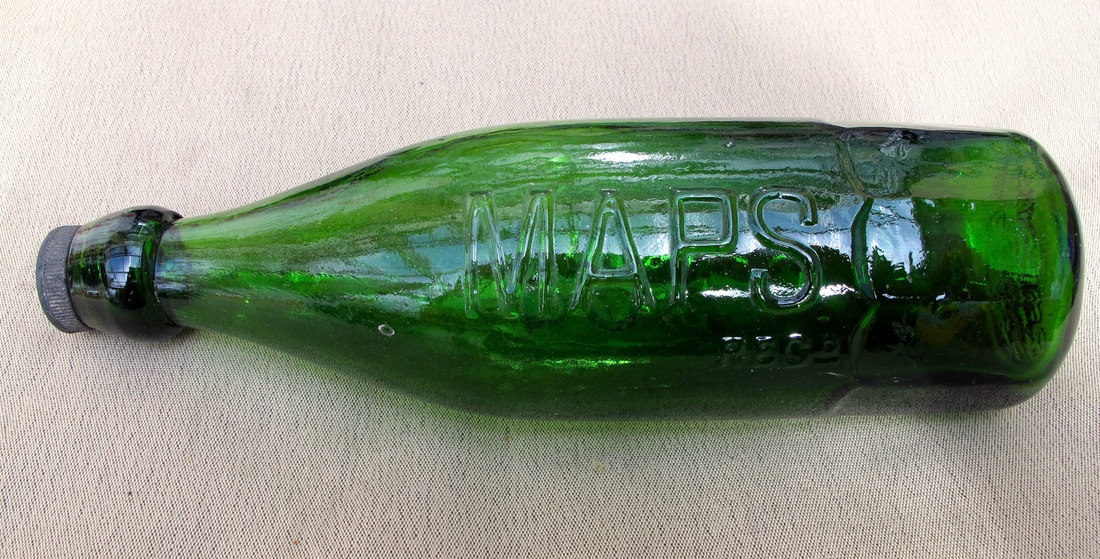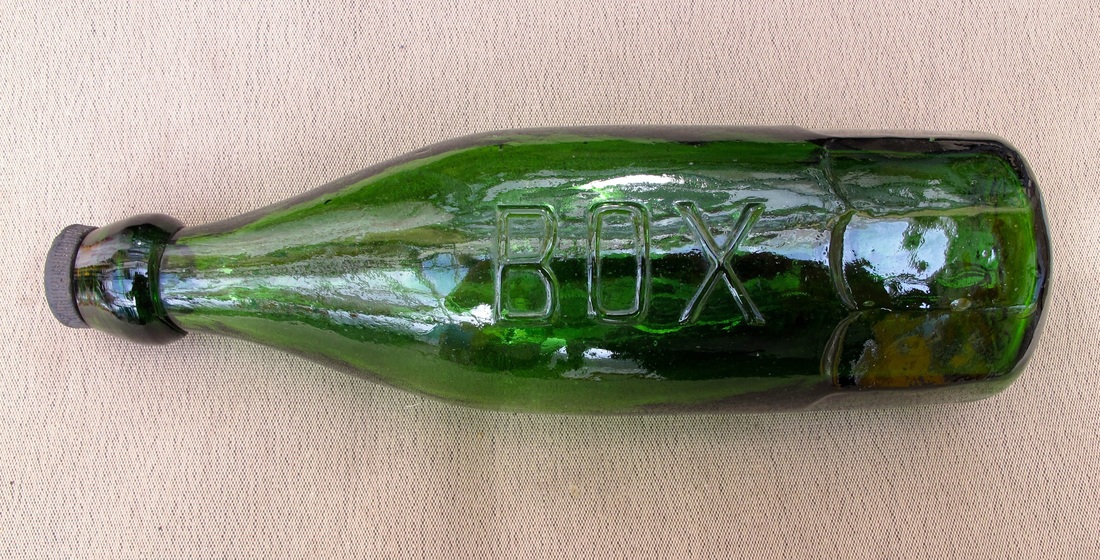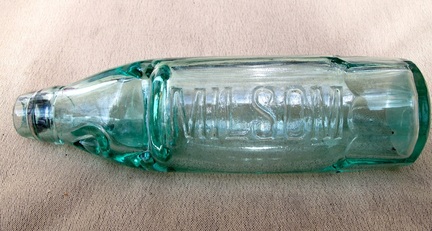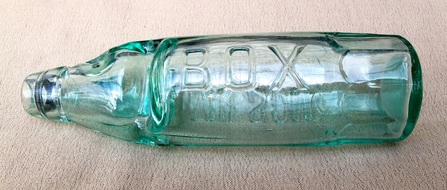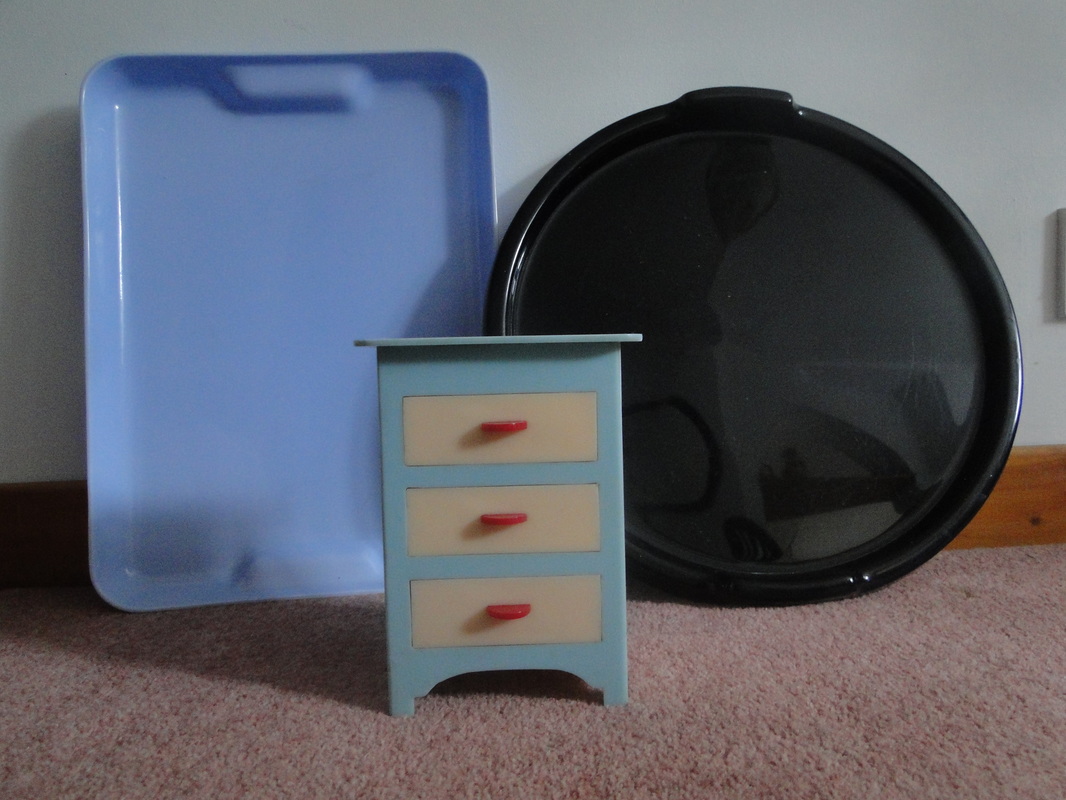Manufacturing Industries Located on Box Hill Alan Payne May 2015
The Victorian period was the start of national mass production and distribution but its roots were in small, local industrial processes. In rural areas like Box there was scope for local manufacturers to utilise mechanisation and regional marketing.
Several unusual industries grew up on Box Hill, conveniently within reach of the village but where more land was available and labour began to be plentiful.
Several unusual industries grew up on Box Hill, conveniently within reach of the village but where more land was available and labour began to be plentiful.
Early views of the isolation of Box Hill (photos courtesy Paul De'Ath).
MAPS Mineral Water Bottling
MAPS, Milsom's Aerated Products, was started by David Milsom, the owner of the Rising Sun Inn on Box Hill, in the years before the First World War. The business bottled spring water which came from a natural well 33 feet deep underground and 16 feet deep, on the site of Dorma, Box Hill, formerly known as Quarr Close.[1] The water was drawn up using a semi-rotary hand-pump to the bottling plant. The spring still runs under the garages at the location.
On 22 Sept 1909 David Milsom applied to alter existing buildings at the pub to create a factory for bottling mineral water using the water supply from the Hartham estate. They sold mineral water and lemonade in codd (marble-stopper) glass bottles embossed with the MAPS name on it.[2] By about 1915 the MAPS trademark was no longer used and was replaced by the MILSOM name.[3]
MAPS, Milsom's Aerated Products, was started by David Milsom, the owner of the Rising Sun Inn on Box Hill, in the years before the First World War. The business bottled spring water which came from a natural well 33 feet deep underground and 16 feet deep, on the site of Dorma, Box Hill, formerly known as Quarr Close.[1] The water was drawn up using a semi-rotary hand-pump to the bottling plant. The spring still runs under the garages at the location.
On 22 Sept 1909 David Milsom applied to alter existing buildings at the pub to create a factory for bottling mineral water using the water supply from the Hartham estate. They sold mineral water and lemonade in codd (marble-stopper) glass bottles embossed with the MAPS name on it.[2] By about 1915 the MAPS trademark was no longer used and was replaced by the MILSOM name.[3]
Recollections from Box residents suggests that they made two kinds of lemonade, red and white, with not a lot of difference in flavour between them, although quite pleasant. A man named Hemmings delivered the crates of bottles by horse and cart to many local pubs, farms and households. The factory continued production after David's death in 1925 and it was still viable to pump it up before 1934 but the trade ceased when David Milsom's son joined the Navy.
Moon Aircraft Limited
The factory at Clift Works on Box Hill is reputed to have started in 1940, supplying parts for the aircraft being built in the tunnels below Box Hill.[4] It was a subsidiary of the Bath and Portland Stone Firms who owned the site of the old quarry at Clift. Its main trade was in Perspex cockpit windows and after the war ended it sought to diversify.
Moon Aircraft Limited
The factory at Clift Works on Box Hill is reputed to have started in 1940, supplying parts for the aircraft being built in the tunnels below Box Hill.[4] It was a subsidiary of the Bath and Portland Stone Firms who owned the site of the old quarry at Clift. Its main trade was in Perspex cockpit windows and after the war ended it sought to diversify.
By 1949 the company reported that Moon was making a loss: due to the shortage of raw materials and re-jigging and tooling for a large new programme (of change).[6]
Conclusion
There had been little manufacturing in Box for almost a century. This was entirey different to the Victorian village when there were many industries, the biggest of which were the stone quarries, farming and the railway service trades. All of these had roots in the early Victorian period. Some of the other trades which grew up, such as brewing and the candle factory, are dealt with elsewhere in this issue. Some of the factories disappeared after the First World War, a few continued afterwards. In the Parish Magazine of August 1963, Mr J King wrote his epitaph to the demise of Box Mill:
I should like to recall, with the closing down of the Mill Lane Flour Mill, the changing face of industry in Box over the past half century. The Flour Mill is the last of these industries to come to an end. It used to be a Cloth Mill years ago. I now understand that it will shortly be taken over as a motor spares distribution centre. Casting my memory back some 50 years or so, I remember the old tallow and candle factory at Quarry Hill where the rubber factory now operates. This factory was well known for its hard scrubbing soap, the business being carried on by the Vezey family.
Then of course there was the beer industry. There was a brewery, owned by the Pinchin family, in the premises opposite the School, and which later was taken over by Murray and Baldwin's (famous for their tennis rackets etc). Whilst on the subject of beer, all the village public houses, with the exception of the Bear, brewed their own beer. Well do I remember when as a stone apprentice how I used to clean out the beer vats at the Northey Arms Hotel, owned in those days by Mr Walter Shewring, a stone contractor. Box also was the proud possessor of a village blacksmith, Mr Phelps.
There had been little manufacturing in Box for almost a century. This was entirey different to the Victorian village when there were many industries, the biggest of which were the stone quarries, farming and the railway service trades. All of these had roots in the early Victorian period. Some of the other trades which grew up, such as brewing and the candle factory, are dealt with elsewhere in this issue. Some of the factories disappeared after the First World War, a few continued afterwards. In the Parish Magazine of August 1963, Mr J King wrote his epitaph to the demise of Box Mill:
I should like to recall, with the closing down of the Mill Lane Flour Mill, the changing face of industry in Box over the past half century. The Flour Mill is the last of these industries to come to an end. It used to be a Cloth Mill years ago. I now understand that it will shortly be taken over as a motor spares distribution centre. Casting my memory back some 50 years or so, I remember the old tallow and candle factory at Quarry Hill where the rubber factory now operates. This factory was well known for its hard scrubbing soap, the business being carried on by the Vezey family.
Then of course there was the beer industry. There was a brewery, owned by the Pinchin family, in the premises opposite the School, and which later was taken over by Murray and Baldwin's (famous for their tennis rackets etc). Whilst on the subject of beer, all the village public houses, with the exception of the Bear, brewed their own beer. Well do I remember when as a stone apprentice how I used to clean out the beer vats at the Northey Arms Hotel, owned in those days by Mr Walter Shewring, a stone contractor. Box also was the proud possessor of a village blacksmith, Mr Phelps.
Milsom Family at Rising Sun
Joseph (1795-), baker and grocer, married Mary (1793-) and the family moved to Box Quarries before 1851, presumably to provision the quarry workers there. Children included David Milsom (1833-1899).
David Milsom (born 1833 at Holt-2 March 1899) married Amelia L Razey (1833-1890) at Pewsey in 1856. By 1861 Joseph was recorded in the Rising Sun pub as a victualler and David next door a farmer of 24 acres but possibly occupying part of the pub building. By 1881 their properties had been reversed with David in the pub called farmer and innkeeper and Joseph next door as 77-year-old grocer.
Children of David and Amelia: Eliza (1857-1899); John (1858-); Harriett Mary (1859-); David (1862-1925); Ann Amelia (1864-); Emma Jane (1866-); George Arthur (1867-); Ellen (1869-); Florence (1873-); and Agnes (1877-). David died on 2 March 1899 leaving £1,762.
Eliza Milsom (1857-16 January 1899), spinster, from the Rising Sun, died 6 weeks before her father and left her probate of £451.18s.5d to Joseph refreshment-contractor. Eliza’s history is fascinating and in 1891, aged 33, she was running a Home for Imbeciles at Southville, near Bath View, on the road adjacent to the A4 at Box Hill. She had two patients, a boy aged 17 and girl aged 14. It must have been a daunting task for a young woman.
David (1862-27 November 1925) from the Rising Sun left £1,229.16s.8d. There is sometimes confusion between different David Milsoms. The two mentioned here David (1833-1899) and his son David (1862-1925) were not the same as David (1855-1927) who was a well-known quarryman at Clift Quarry Works.
Joseph (1795-), baker and grocer, married Mary (1793-) and the family moved to Box Quarries before 1851, presumably to provision the quarry workers there. Children included David Milsom (1833-1899).
David Milsom (born 1833 at Holt-2 March 1899) married Amelia L Razey (1833-1890) at Pewsey in 1856. By 1861 Joseph was recorded in the Rising Sun pub as a victualler and David next door a farmer of 24 acres but possibly occupying part of the pub building. By 1881 their properties had been reversed with David in the pub called farmer and innkeeper and Joseph next door as 77-year-old grocer.
Children of David and Amelia: Eliza (1857-1899); John (1858-); Harriett Mary (1859-); David (1862-1925); Ann Amelia (1864-); Emma Jane (1866-); George Arthur (1867-); Ellen (1869-); Florence (1873-); and Agnes (1877-). David died on 2 March 1899 leaving £1,762.
Eliza Milsom (1857-16 January 1899), spinster, from the Rising Sun, died 6 weeks before her father and left her probate of £451.18s.5d to Joseph refreshment-contractor. Eliza’s history is fascinating and in 1891, aged 33, she was running a Home for Imbeciles at Southville, near Bath View, on the road adjacent to the A4 at Box Hill. She had two patients, a boy aged 17 and girl aged 14. It must have been a daunting task for a young woman.
David (1862-27 November 1925) from the Rising Sun left £1,229.16s.8d. There is sometimes confusion between different David Milsoms. The two mentioned here David (1833-1899) and his son David (1862-1925) were not the same as David (1855-1927) who was a well-known quarryman at Clift Quarry Works.
References
[1] Local information courtesy Eric Callaway who lived at Dorma, next door.
[2] Family anecdote from Linda Finch
[3] http://www.omphalos.org.uk/Bottles/mike4/Companies/Boxhill.html
[4] Bath Weekly Chronicle and Herald, 27 October 1945
[5] Bath Weekly Chronicle and Herald, 12 April 1947
[6] Bath Weekly Chronicle and Herald, 7 May 1949
[1] Local information courtesy Eric Callaway who lived at Dorma, next door.
[2] Family anecdote from Linda Finch
[3] http://www.omphalos.org.uk/Bottles/mike4/Companies/Boxhill.html
[4] Bath Weekly Chronicle and Herald, 27 October 1945
[5] Bath Weekly Chronicle and Herald, 12 April 1947
[6] Bath Weekly Chronicle and Herald, 7 May 1949
